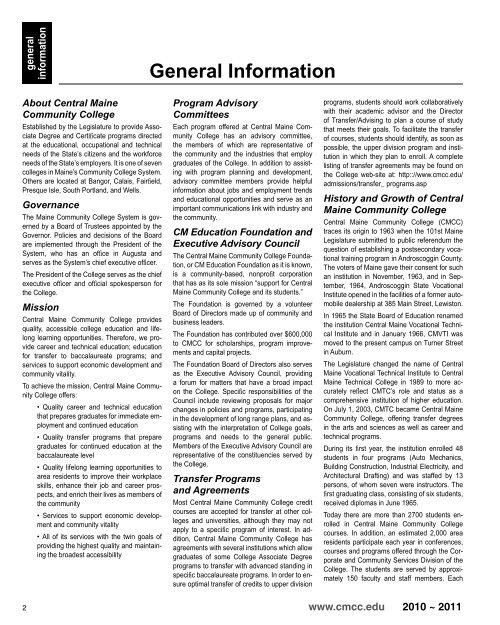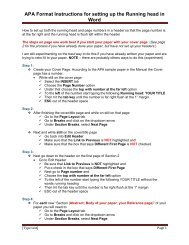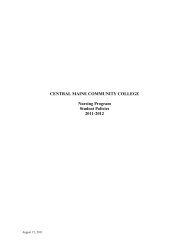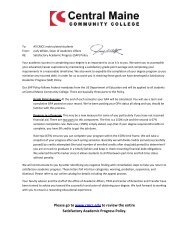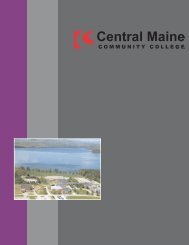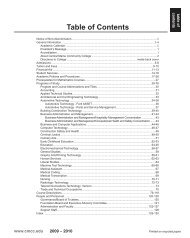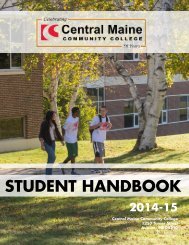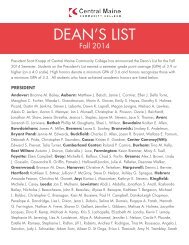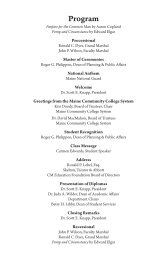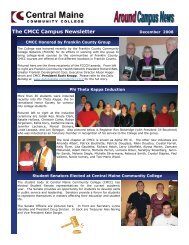Academic Policies and Procedures - Central Maine Community ...
Academic Policies and Procedures - Central Maine Community ...
Academic Policies and Procedures - Central Maine Community ...
Create successful ePaper yourself
Turn your PDF publications into a flip-book with our unique Google optimized e-Paper software.
general<br />
information<br />
General Information<br />
About <strong>Central</strong> <strong>Maine</strong><br />
<strong>Community</strong> College<br />
Established by the Legislature to provide Associate<br />
Degree <strong>and</strong> Certifi cate programs directed<br />
at the educational, occupational <strong>and</strong> technical<br />
needs of the State’s citizens <strong>and</strong> the workforce<br />
needs of the State’s employers. It is one of seven<br />
colleges in <strong>Maine</strong>’s <strong>Community</strong> College System.<br />
Others are located at Bangor, Calais, Fairfield,<br />
Presque Isle, South Portl<strong>and</strong>, <strong>and</strong> Wells.<br />
Governance<br />
The <strong>Maine</strong> <strong>Community</strong> College System is governed<br />
by a Board of Trustees appointed by the<br />
Governor. <strong>Policies</strong> <strong>and</strong> decisions of the Board<br />
are implemented through the President of the<br />
System, who has an offi ce in Augusta <strong>and</strong><br />
serves as the System’s chief executive officer.<br />
The President of the College serves as the chief<br />
executive offi cer <strong>and</strong> offi cial spokesperson for<br />
the College.<br />
Mission<br />
<strong>Central</strong> <strong>Maine</strong> <strong>Community</strong> College pro vides<br />
quality, accessible college education <strong>and</strong> lifelong<br />
learning opportunities. There fore, we provide<br />
career <strong>and</strong> technical education; education<br />
for transfer to baccalaureate programs; <strong>and</strong><br />
services to support economic development <strong>and</strong><br />
com munity vitality.<br />
To achieve the mission, <strong>Central</strong> <strong>Maine</strong> <strong>Community</strong><br />
College offers:<br />
• Quality career <strong>and</strong> technical education<br />
that prepares graduates for immediate employment<br />
<strong>and</strong> continued education<br />
• Quality transfer programs that pre pare<br />
graduates for continued educa tion at the<br />
baccalaureate level<br />
• Quality lifelong learning opportuni ties to<br />
area residents to improve their workplace<br />
skills, enhance their job <strong>and</strong> career prospects,<br />
<strong>and</strong> enrich their lives as members of<br />
the community<br />
• Services to support economic development<br />
<strong>and</strong> community vitality<br />
• All of its services with the twin goals of<br />
providing the highest quality <strong>and</strong> maintaining<br />
the broadest accessibility<br />
Program Advisory<br />
Committees<br />
Each program offered at <strong>Central</strong> <strong>Maine</strong> <strong>Community</strong><br />
College has an advisory com mittee,<br />
the members of which are repre sentative of<br />
the community <strong>and</strong> the industries that employ<br />
graduates of the College. In addition to assisting<br />
with pro gram planning <strong>and</strong> development,<br />
advisory committee members provide helpful<br />
infor mation about jobs <strong>and</strong> employment trends<br />
<strong>and</strong> educational opportunities <strong>and</strong> serve as an<br />
important communications link with industry <strong>and</strong><br />
the community.<br />
CM Education Foundation <strong>and</strong><br />
Executive Advisory Council<br />
The <strong>Central</strong> <strong>Maine</strong> <strong>Community</strong> College Foundation,<br />
or CM Education Foundation as it is known,<br />
is a community-based, non profit corporation<br />
that has as its sole mis sion “support for <strong>Central</strong><br />
<strong>Maine</strong> <strong>Community</strong> College <strong>and</strong> its students.”<br />
The Foundation is governed by a volunteer<br />
Board of Directors made up of community <strong>and</strong><br />
business leaders.<br />
The Foundation has contributed over $600,000<br />
to CMCC for scholarships, pro gram improvements<br />
<strong>and</strong> capital projects.<br />
The Foundation Board of Directors also serves<br />
as the Executive Advisory Council, providing<br />
a forum for matters that have a broad impact<br />
on the College. Specific responsibilities of the<br />
Council include reviewing proposals for major<br />
changes in policies <strong>and</strong> programs, partici pating<br />
in the development of long range plans, <strong>and</strong> assisting<br />
with the interpretation of College goals,<br />
programs <strong>and</strong> needs to the general public.<br />
Members of the Execu tive Advisory Council are<br />
representative of the constituencies served by<br />
the College.<br />
Transfer Programs<br />
<strong>and</strong> Agreements<br />
Most <strong>Central</strong> <strong>Maine</strong> <strong>Community</strong> College credit<br />
courses are accepted for transfer at other colleges<br />
<strong>and</strong> universities, although they may not<br />
apply to a specific program of interest. In addition,<br />
<strong>Central</strong> <strong>Maine</strong> <strong>Community</strong> College has<br />
agreements with several institutions which allow<br />
graduates of some College Associate Degree<br />
pro grams to transfer with advanced st<strong>and</strong>ing in<br />
specific baccalaureate programs. In order to ensure<br />
optimal transfer of credits to upper division<br />
programs, students should work collaboratively<br />
with their aca demic advisor <strong>and</strong> the Director<br />
of Trans fer/Advising to plan a course of study<br />
that meets their goals. To facilitate the transfer<br />
of courses, students should identify, as soon as<br />
possible, the upper division pro gram <strong>and</strong> institution<br />
in which they plan to enroll. A complete<br />
listing of transfer agree ments may be found on<br />
the College web-site at: http:://www.cmcc.edu/<br />
admissions/transfer_ programs.asp<br />
History <strong>and</strong> Growth of <strong>Central</strong><br />
<strong>Maine</strong> <strong>Community</strong> College<br />
<strong>Central</strong> <strong>Maine</strong> <strong>Community</strong> College (CMCC)<br />
traces its origin to 1963 when the 101st <strong>Maine</strong><br />
Legislature submitted to public referendum the<br />
question of establishing a postsecondary vocational<br />
training program in Androscoggin County.<br />
The voters of <strong>Maine</strong> gave their consent for such<br />
an institution in November, 1963, <strong>and</strong> in September,<br />
1964, Androscoggin State Vocational<br />
Institute opened in the facilities of a former automobile<br />
dealership at 385 Main Street, Lewiston.<br />
In 1965 the State Board of Education renamed<br />
the institution <strong>Central</strong> <strong>Maine</strong> Vocational Technical<br />
Institute <strong>and</strong> in January 1966, CMVTI was<br />
moved to the present campus on Turner Street<br />
in Auburn.<br />
The Legislature changed the name of <strong>Central</strong><br />
<strong>Maine</strong> Vocational Technical Institute to <strong>Central</strong><br />
<strong>Maine</strong> Technical College in 1989 to more accurately<br />
refl ect CMTC’s role <strong>and</strong> status as a<br />
comprehensive institution of higher education.<br />
On July 1, 2003, CMTC became <strong>Central</strong> <strong>Maine</strong><br />
<strong>Community</strong> College, offering transfer degrees<br />
in the arts <strong>and</strong> sciences as well as career <strong>and</strong><br />
technical programs.<br />
During its first year, the institution enrolled 48<br />
students in four programs (Auto Mechanics,<br />
Building Construction, Industrial Electricity, <strong>and</strong><br />
Architectural Drafting) <strong>and</strong> was staffed by 13<br />
persons, of whom seven were instructors. The<br />
first graduating class, consisting of six students,<br />
received diplomas in June 1965.<br />
Today there are more than 2700 students enrolled<br />
in <strong>Central</strong> <strong>Maine</strong> <strong>Community</strong> College<br />
courses. In addition, an estimated 2,000 area<br />
residents participate each year in conferences,<br />
courses <strong>and</strong> programs offered through the Corporate<br />
<strong>and</strong> <strong>Community</strong> Services Division of the<br />
College. The students are served by approximately<br />
150 faculty <strong>and</strong> staff members. Each<br />
2 www.cmcc.edu 2010 ~ 2011


